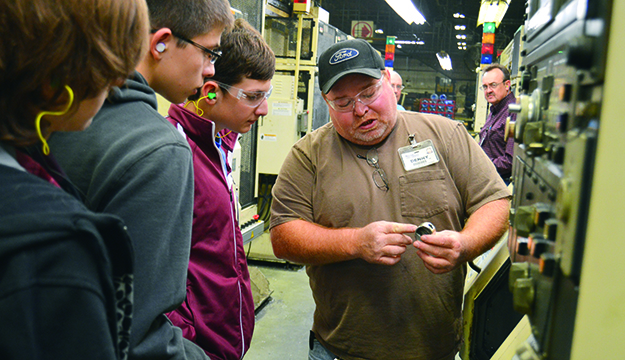
Les Kestner of Bristol Compressors shows students how a compressor is made. Photos by Scott Robertson
By Scott Robertson
When Bristol Compressors CEO Ed Gniewek told the Bristol Chamber of Commerce Board this summer that he perceived the qualified workforce in the region to be diminishing to the point where he would consider moving the company’s operations, the Chamber could have reacted in many different ways. Rather than choosing easy ways out like denial, blame-storming or hand-wringing, the Chamber’s reaction has been one of action.
On Oct. 20, the Chamber had worked with Bristol Compressors to bring 30 seniors from Bristol, Tennessee High School and Bristol, Virginia High School to the company’s plant for a tour. Considering the Chamber had to juggle the schedules of two high schools and two companies (The Robinette Company also hosted the students that day) in addition to its own, the turnaround was pretty quick.
Beth Rhinehart, Chamber president, said she had already been talking with local educators about promoting career paths other than four-year-college. “K-12 education is obviously the pipeline for any career choice, be it college or a trade,” she said. “We have more and more students who don’t necessarily see college as the end-all be-all. The push in K-12 to make college the end-all be-all is not working. There are other paths that are to be recognized and not judged. There’s been a lot of study done that suggests 60 percent of jobs will not require a four-year degree.”
 Because the experiences children have from sixth through twelfth grade have a significant impact on their career path choices, Rhinehart said, it made sense to give them a first-hand experience with local manufacturers.
Because the experiences children have from sixth through twelfth grade have a significant impact on their career path choices, Rhinehart said, it made sense to give them a first-hand experience with local manufacturers.
“There were some kids who said, ‘Yeah, this is what I would like to do,’” Rhinehart said. “They might never have thought that if they had not had that experience.”
Rick Nunley, executive director of human resources for Bristol Compressors welcomed the students to the plant before splitting them into small groups for the tour. He explained to them Bristol Compressors’ interest in hosting them.
“We’re trying to go out and re-establish communication at the high school level that puts possibilities to individuals that might not have that desire to go into higher education, but might have the desire to enter the workforce right after high school,” Nunley told the students. “We want to reintroduce manufacturing down on the high school senior footprint and sometimes even below that. So you’re here today to look at possibilities for future labor. I don’t know what your ambitions are, but our ambition today is to expose you, to show you, and hopefully to have you walk away and realize an employer you might not even have thought about exists right here in your back yard, with the possibility of sound employment for years and years to come.”
Nunley quantified the opportunity for the students, telling them they would not be the last tour group his firm hosts. “This is not a flavor of the month, because within five years we could see as many as 800 new requirements here at Bristol Compressors.” To put that in context, there are fewer than 800 students at Bristol, Virginia High right now.
“You’re going into a 750,000-square-foot facility,” Nunley told the seniors. “We employ right at 900 employees. Our average tenure at this facility is 21 years. The 40-year plan still does exist here at Bristol Compressors.”
The idea of spending one’s entire career with the same company was clearly something many students had not previously considered. The average American will have 13 different jobs over the course of his or her career.
The Bristol Compressors tours were led by quality team leaders who could show students several different areas, pointing out the different jobs being done and giving details on what’s involved in each.
After touring the facility, the students heard from David Rowe, vice president of manufacturing operations about the satisfaction a career in manufacturing offers. “Being able to say, ‘I made that,’ gives you a sense of pride,” Rowe said. “You need to know that manufacturing is a valid industry to build a future for you and your family.”
The Bristol Compressors tour was actually the second tour of the day for the seniors, who visited The Robinette Company in Bristol, Tenn., that morning. Carolynn Ferrell, vice president for human resources and company relations for Robinette said her company took a different tack, showing how diverse the field of manufacturing really is. “We showed them our graphics department, the mounting department, accounting and human resources. We told them about all the different jobs that make this company run.”

A group of students looks on as a Bristol Compressors employee uses a mallet to finesse a piece into place.
Students appeared enthused after the tours, peppering Paul Robinette, the company communications specialist with questions about topics from quality control to sustainability.
Ferrell said her company would welcome the opportunity to host more students, perhaps from Sullivan County high schools. “We would like for students to get to know us better so they will look to us in the future as an employer of choice. They need to see what we need and expect in terms of soft skills.”
At the end of the day, everyone seemed satisfied with the experience, Rhinehart said. The employers saw enthusiastic young potential employees. The Chamber saw the two groups coming together, and “the students saw that manufacturing is not just what they always thought it was. There are different layers to that environment.”
No one is suggesting tours like this are a panacea that will solve all of manufacturing’s human resources woes in Northeast Tennessee and Southwest Virginia. But the gauntlet has been picked up.


